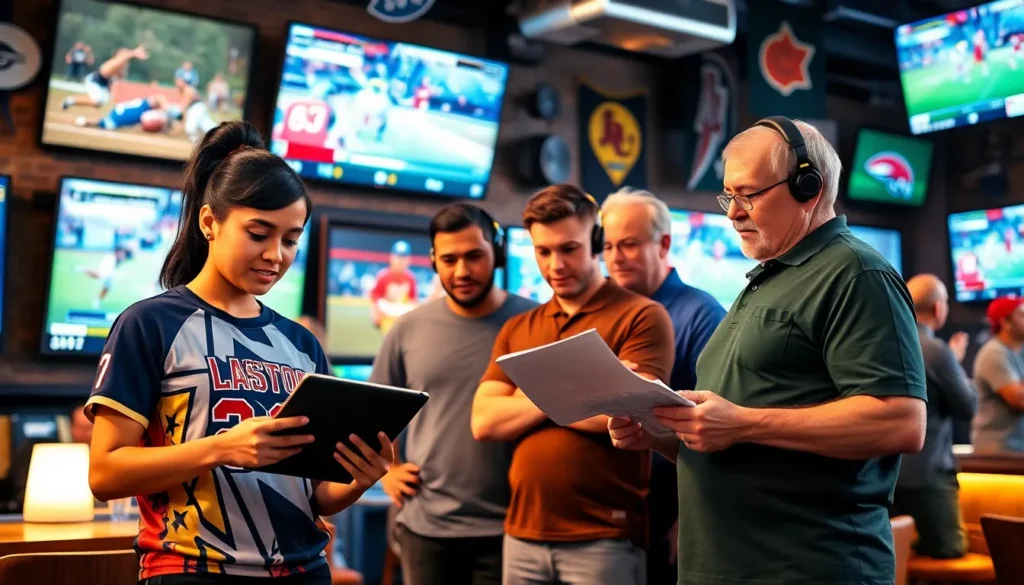In a world where robots might soon serve your morning coffee, the hospitality industry is stepping into the future with artificial intelligence. Imagine checking into a hotel without a single human interaction—just you and a friendly AI ready to cater to your every whim. It sounds like a sci-fi movie, but it’s happening now, and it’s revolutionizing the way guests experience travel.
Table of Contents
ToggleOverview of Artificial Intelligence in Hospitality Industry
Artificial intelligence reshapes the hospitality industry by enhancing operational efficiency and improving guest experiences. Hotels increasingly adopt AI tools for personalized services. Automated chatbots respond to customer inquiries, providing instant support. These systems analyze data to tailor recommendations based on individual preferences.
AI-driven analytics optimize pricing strategies by predicting demand fluctuations. Managers rely on this data to adjust room rates in real-time. Robots manage check-ins and check-outs, reducing wait times and streamlining processes. Guests enjoy quicker services without needing to interact with staff.
Voice assistants facilitate room controls, allowing guests to regulate lighting and temperature through simple commands. This technology promotes convenience and satisfaction during their stays. Predictive maintenance powered by AI also ensures that equipment functions properly, minimizing disruptions for guests.
In many cases, AI systems offer insights into customer behavior. These insights help businesses create targeted marketing efforts that appeal to specific demographics. By anticipating needs, hotels can enhance overall customer satisfaction.
Over time, AI’s role in the hospitality sector is expected to expand. Future developments may involve more sophisticated robots and AI systems capable of managing complex tasks. This evolution signals an industry poised for further technological advancements that prioritize guest engagement and operational effectiveness.
Applications of AI in Hospitality

AI significantly reshapes the hospitality landscape, offering innovative solutions that enhance service delivery and operational efficiency.
Enhancing Customer Experience
AI personalizes interactions with guests, leading to tailored services that improve satisfaction. Chatbots provide immediate support, addressing common inquiries and booking requests round the clock. Voice-activated assistants allow guests to adjust room settings effortlessly, creating a convenient environment. Furthermore, AI-driven analytics track preferences, enabling hotels to suggest relevant services and promotions. This level of customization fosters stronger guest relationships, ensuring memorable stays and repeat visits.
Streamlining Operations
AI optimizes daily operations, leading to increased efficiency for hospitality businesses. Automated check-in and check-out processes significantly reduce wait times and improve guest flow. Resource allocation becomes smarter through AI tools that analyze booking patterns and occupancy rates. Predictive maintenance minimizes service disruptions by forecasting equipment needs, allowing for preemptive action. Staffing efficiency improves as AI matches worker schedules to demand fluctuations, ensuring timely service delivery without overstaffing.
Benefits of AI in Hospitality Industry
Artificial intelligence brings transformative benefits to the hospitality industry, enhancing operations and guest experiences significantly. Key advantages include increased efficiency and personalization.
Increased Efficiency
AI leads to streamlined operations within hotels. Automated systems handle routine check-ins and check-outs, reducing guest waiting times. Predictive analytics anticipate maintenance needs, allowing for proactive equipment servicing. By analyzing booking patterns, AI optimizes staffing and resource allocation, ensuring businesses operate smoothly even during peak seasons. Enhanced efficiency reduces costs while improving service delivery, making operations more responsive to guest demands.
Personalization and Customization
Personalization is revolutionized through artificial intelligence. AI-driven tools analyze guest data to create tailored experiences, offering customized recommendations that align with individual preferences. Voice-activated assistants enable guests to control their room environment, adjusting lighting and temperature without hassle. Dynamic pricing strategies, guided by AI, suggest relevant promotions based on past behavior, ensuring guests feel valued. Enhanced engagement through personalized services fosters loyalty and encourages repeat visits, ultimately strengthening the hotel’s relationship with its customers.
Challenges in Implementing AI
Implementing artificial intelligence in the hospitality industry presents several challenges that organizations must navigate to fully realize its benefits.
Data Privacy Concerns
Data privacy remains a significant challenge as hotels collect vast amounts of personal information from guests. Many customers express concerns regarding how their data is stored, shared, and utilized. Compliance with regulations, such as GDPR, necessitates that organizations implement stringent data protection measures. Hotels must adopt transparent privacy policies to gain guests’ trust. Ensuring data security is vital; breaches can lead to severe financial and reputational damage.
Integration with Existing Systems
Integrating AI solutions with existing hospitality management systems poses another challenge. Many hotels operate on legacy systems that lack the flexibility needed for AI compatibility. Upgrading these systems can incur high costs and guest disruptions. Efficient integration requires careful planning and technical expertise. Organizations must invest in training staff to effectively utilize new AI tools. Collaboration with technology providers can streamline the transition, facilitating a more seamless integration process.
Future Trends in AI for Hospitality
Artificial intelligence continues to evolve quickly within the hospitality sector, showcasing a variety of emerging trends that will shape its future. Enhanced personalization plays a crucial role in AI’s development, where algorithms analyze guest data to tailor experiences based on individual preferences.
Chatbots will become even more sophisticated, providing 24/7 support and addressing inquiries more contextually. In addition, voice-activated technology is expected to gain traction, allowing guests to control room environments with simple commands.
Predictive analytics will transform operational strategies, offering insights on booking patterns, occupancy rates, and guest behaviors. Utilizing this data enables hoteliers to create customized promotions and pricing strategies that attract guests effectively.
Robots will take on more tasks beyond check-in and check-out, including housekeeping and maintenance. These robots can perform routine duties, allowing staff to focus on delivering exceptional service.
AI-powered platforms will enable seamless integration with legacy systems, improving operational efficiency and reducing costs. Collaborative solutions from technology providers will support hotels in the transition to advanced AI systems more effectively.
Privacy measures will remain a priority as hotels implement AI solutions, addressing data protection concerns with transparency and compliance. Regulations like GDPR will drive the creation of robust privacy policies to safeguard guest information.
Finally, the trend of utilizing AI for sustainability will rise. Hotels will leverage AI to optimize resource usage, reduce waste, and minimize energy consumption, contributing to environmentally responsible practices within the industry.
The integration of artificial intelligence in the hospitality industry marks a pivotal shift towards enhanced guest experiences and operational efficiency. As hotels embrace AI technologies like chatbots and predictive analytics, they’re not just streamlining processes but also personalizing interactions to foster loyalty.
The future promises even greater advancements with sophisticated AI solutions that will redefine how guests engage with services. While challenges such as data privacy and system integration remain, the potential for innovation is immense. By prioritizing guest trust and investing in technology, the hospitality sector can navigate these complexities and fully harness AI’s transformative power. The journey ahead is one of exciting possibilities for both hotels and their guests.





